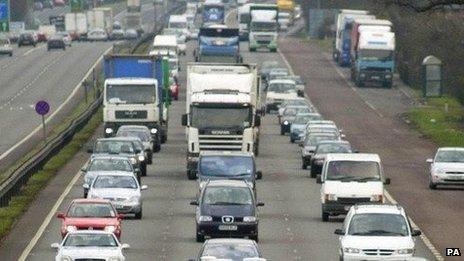Plan to use tolls to fund A14 improvements abandoned
- Published

The A14 works between Huntingdon and Cambridge could finish in 2019-20
Plans to create the UK's first toll road for a decade are to be dropped, with improvements to the A14 instead funded from general taxation.
The scheme involves widening a heavily congested 25-mile stretch in East Anglia carrying traffic from the port of Felixstowe to the Midlands.
Prime Minister David Cameron has said he understands the strong opposition to the proposal to charge motorists.
The plan had been to raise 20% of the overall £1.5bn cost from tolls.
The Highways Agency had said that charges could be set at between £1 and £1.50 for cars using the 12-mile (19km) stretch of toll road, and about double this sum for lorries, although these figures were not finalised.
Overnight trips were to have been toll-free.

But Chief Secretary to the Treasury Danny Alexander is expected to announce soon that the scheme has been dropped.
Road users reacted to the government's decision, with Fred Hand, a retired forklift truck engineer from Grantham, Lincolnshire, telling the BBC: "There's a real bottleneck between Huntingdon and Cambridge and it means delays every day. I hope something is going to happen.
"I'm glad we won't have to pay, but I would have paid to use the tolls because it's so bad. Anything to ensure the road is upgraded."
'Hard sell'
Ken Sanderson, a charity worker from Hadleigh, Suffolk, said: "I don't think the government considered the impact of the toll idea. Adding costs for lorries travelling from Felixstowe would badly affect East Anglia and the whole east of England.
"We pay the same road tax and fuel as people in Birmingham, Manchester and London, but I expect we don't get the same spending per head on roads.
"I know there's more population in those places, but East Anglia is trying to raise its profile, such as the IT developments taking place in Cambridge.
"Then there's the sort of bread-and-butter trade from Felixstowe, which is being disrupted."
He added: "The tolls would also have had an environmental impact, going on to the cheaper roads and causing congestion in towns and villages."
RAC Foundation director Stephen Glaister called the government's decision "a victory for common sense", adding: "Piecemeal tolling that would raise little money but create a lot of aggravation and delay was always going to be a hard sell and not the best advert for pay-as-you-go driving."
Plans to upgrade the A14 have been discussed for several years.
'Strong feelings'
In September, Mr Cameron said: "I think there is a strong case for saying when you're putting in new capacity, when you're dealing with congestion, that some of the people who are going to benefit from that, should pay something towards it.
"Everybody knows that we're living in circumstances where the government can't just create money.
"We have to live within our means. If we want transport programmes to go ahead - but we deal with our deficits and debts at the same time - we sometimes have to make some tough decisions."
But at the prime minister's weekly Commons question session last week he said: "I am well aware of the strong feelings in Suffolk about this issue and I have been approached about it by many Members of Parliament.
"I believe that road tolls can play an important part in providing new road capacity and it is important that we find ways to pay for road capacity, but I also understand the concerns about this individual case."
South Suffolk MP Tim Yeo had asked him whether he agreed there was a "risk that introducing tolls on roads without a toll-free alternative may undermine support for the sensible concept of road pricing".
- Published3 December 2013
- Published17 September 2013
- Published26 November 2013
- Published27 September 2013